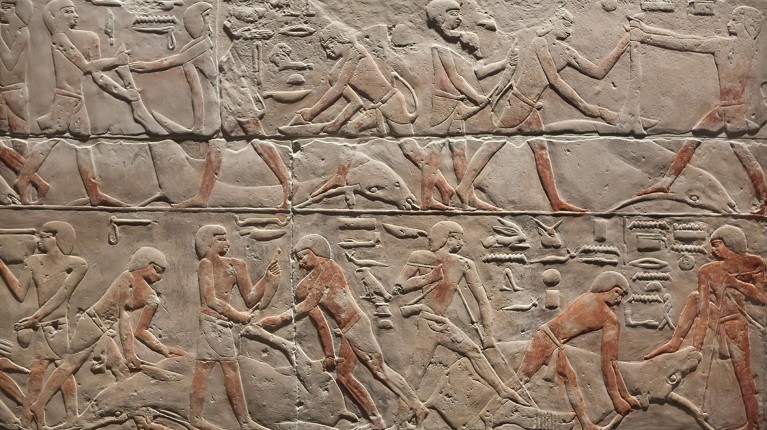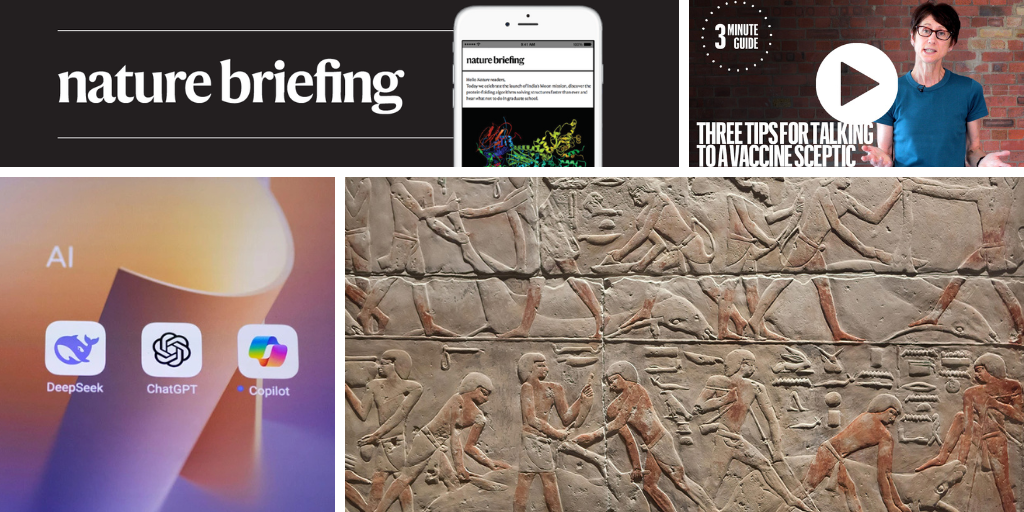You have full access to this article via your institution.
Hello Nature readers, would you like to get this Briefing in your inbox free every day? Sign up here.

The Ancient Egyptian Old Kingdom (2686–2125 bc) produced many lasting artefacts — but little DNA has survived.Credit: Azoor Photo/Alamy
Teeth from the remains of an elderly man who lived approximately 4,800 years ago — around the time that the earliest pyramids were built — have yielded the first full human genome sequence from ancient Egypt. The genome reveals ancestry similar to that of other ancient North Africans, as well as to people from the Middle East. Previous attempts to sequence DNA from ancient Egyptians have used samples from mummies, to mixed results. The remains used in this study pre-date widespread mummification: the person was interred instead in a ceramic pot, a sign of high, but not elite, status.
The abstracts of around one in seven biomedical-research papers published in 2024 were probably written with the help of artificial intelligence (AI). Researchers searched for the abstracts for ‘excess words’ that started to appear more often than expected after November 2022, when ChatGPT became widely available. Of the 1.5 million papers indexed by PubMed last year, more than 200,000 of them used such words, many of which were ‘style words’ unrelated to the content of the research, such as ‘unparalleled’ and ‘invaluable’.
Reference: Science Advances paper
A young exoplanet called HIP 67522 b orbits its host star so tightly that it’s slowly destroying itself. The planet whips around the star in under 10 days, releasing waves of magnetic energy as it goes. When these bursts of energy hit the star, they trigger a flare that fires a huge dose of radiation back at the planet, stripping away some of the planet’s atmosphere each time. The findings are the first recorded instance of a planet magnetically influencing the behaviour of its star.
An artificial-intelligence system called Centaur can predict the decisions people will make in a wide variety of situations — often outperforming classical theories used in psychology to describe human choices. Trained on data from 160 psychology experiments in which 60,000 people made more than 10 million choices, the system can simulate human behaviour in tasks from problem-solving and gambling, and even those it hasn’t been trained on. Using Centaur, “you can basically run experimental sessions in silico instead of running them on actual human participants”, says cognitive scientist and study co-author Marcel Binz.
Features & opinion
The iconic statues of Rapa Nui, also known as Easter Island, are crumbling. The statues, called moai, were carved between 500 and 800 years ago and are made of a porous and soft stone, which makes them vulnerable to erosion. Climate change is now accelerating their destruction. In recent decades, extreme weather events such as heavy rainfall and drought-induced wildfire have battered the moai. The placement of some statues along the seafront also leaves them vulnerable to rising sea levels. Now, some of the people of Rapa Nui are in a race against time to preserve these icons of their heritage.
More than 50 research laboratories at the influential Weizmann Institute of Science in Rehovot, Israel were destroyed by the effects of two Iranian missiles on 15 June. Neuroscientist Alon Chen, the president of the Institute, says it can be “on the starting line of a new era for the region” in which scientific collaboration thrives across the Middle East. “I look forward to the day when Israeli scientists can freely collaborate with scientists in Iran and do good for the region and for humanity,” he writes. “I hope and trust that our colleagues around the world who share our values will, together with us, continue to see science as a path towards progress, partnership and peace.”
A surge of research on vaccine hesitancy over the past decade is starting to offer insight into how best to discuss the topic with your inner circle. This 3-minute guide from Nature reporter Helen Pearson aims to help effective communication. “The goal here should be helping someone to make their own informed decision, not telling them what to do,” she says.
Today I’m wondering what I would eat if I were on the International Space Station. The idea of vacuum-packed or freeze-fried food doesn’t exactly have my mouth watering, but there are apparently ways to zhuzh it up.
When astronaut Sophie Adenot heads up to the station next year, she’ll be dining on space-friendly versions of French delicacies such as lobster bisque and haddock velouté prepared by a 10-time Michelin-starred chef. So, if I want the good stuff should I ever get the chance to head into orbit, I’ll just have to make sure I have a renowned chef on speed dial.
What meal would you want to take up into space? Let us know, along with any feedback on this newsletter, at [email protected].
Thanks for reading,
Jacob Smith, associate editor, Nature Briefing
With contributions by Flora Graham
• Nature Briefing: Careers — insights, advice and award-winning journalism to help you optimize your working life
• Nature Briefing: Microbiology — the most abundant living entities on our planet — microorganisms — and the role they play in health, the environment and food systems
• Nature Briefing: Anthropocene — climate change, biodiversity, sustainability and geoengineering
• Nature Briefing: AI & Robotics — 100% written by humans, of course
• Nature Briefing: Cancer — a weekly newsletter written with cancer researchers in mind
• Nature Briefing: Translational Research — covers biotechnology, drug discovery and pharma


